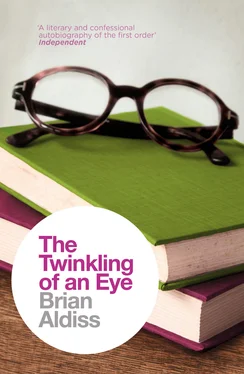In 1941 and 1942, Japanese advances in seven months were more spectacular than any of Adolf Hitler’s blitzkriegs. The wolves came down by boat, plane and bicycle. Their fleets crossed over 3,000 sea miles, their armies engulfed much of China, Hong Kong, the Philippines, Indochina, the Netherlands East Indies, multitudes of Pacific islands, Malaya, Singapore, and Burma, advancing westwards until they stood at the very gates of India. They struck to the south, deeply enough to launch air raids on Darwin in northern Australia. They were a fever virus on the body of the East. Wherever they went, Japanese armies behaved with punishing ruthlessness.
These were the facts we chewed over in Mhow as we handed in respirators lugged all the way from Norwich. We drew jungle green battledress and handed in the absurd KD – khaki drill – and topis with which we had been issued in England. We exchanged gaiters for puttees. Puttees protected ankles and lower legs from venomous things which could be hiding in long grass.
Two Japanese divisions entered Burma in January of 1942. With them went the Burma National Army, led by a man who knew the ground, Aung San, a courageous Burmese destined to fight on both sides in the war, and to father an even more courageous daughter, Aung San Suu Kyi. These divisions captured Rangoon and advanced northwards on Mandalay, which fell in May. It was another in a long line of British disasters. The British and Indians retreated from Mandalay by car, cart and foot. Only one road led out of the trap. They had to travel westwards on the long trail leading to Dimapur, and the railway line to Calcutta.
British counter-offensives along the Burmese coast and in the Arakan, under horrific conditions, met with little success. They served merely to reinforce the picture of a fiendish enemy who could not be beaten. The Japanese would call from the jungle in the dark, like parrots from a thicket, ‘Hello, Johnny! Hello, Johnny! Who fuckee your missus?’ To fire blindly at the taunting voices was to give your position away.
The struggle for Burma, a country larger than France, is a record of disillusion and heroism on both sides. The main protagonists, Britain and Japan (and the USA, as far as it entered the picture) were far distant from the scene of action. This factor contributed enormously to local difficulties. It explains too why very few war photographers were present to place the struggle on visual record.
Disease – malaria, dysentery and various fevers – accounted for as many men as did Japanese bullets and bayonets. Supplying the British XIVth Army was a very low priority where Churchill was concerned. That army felt itself neglected and abandoned to rot in miserable circumstances. It called itself, in a mood of romantic despair, the ‘Forgotten Army’. The label has stuck, and not without reason.
It was the insignia of that army I stitched on to my jungle greens in Mhow, before our detachment was shipped towards the leafy fighting terrain in Burma.
Not for the first time, my life was about to begin anew. But change, uncertainty, had been a feature of life in the years leading up to the outbreak of war with Germany.
Stop and think sometime about the roller coaster I’m on. Some day on Titan, it will be revealed to you just how ruthlessly I’ve been used, and by whom, and to what disgustingly paltry ends.
Kurt Vonnegut
The Sirens of Titan
Summer – time of innocence, time of wickedness.
In the summer of AD 1938, the Boxbaum family came to live next to the Aldiss family. They came in the night, time of secrets, husband and wife and two children. The houses in Bernard Road, Gorleston on Sea, were terraced. Short paths led straight from the gate, across the front gardens to the front door. My parents went out to greet the Boxbaums, who were exhausted and disoriented. Dot took them a standard English panacea, a pot of tea.
The Boxbaums, driven by Nazi tyranny, had arrived safely in England.
Frau Boxbaum was slight and raven-haired. She arrived in Gorleston speaking no English. The boy was about eight, tow-haired. His sister was probably ten or eleven, a pretty girl, dark-haired with eyes of Aegean blue. They were the first foreign children we had met. Playing with us, they mastered English very quickly; we were impressed, it had taken us years to learn the language.
Mother lent Frau Boxbaum cutlery and plates and various necessaries. The family had escaped with very few possessions. The behaviour of my parents – and of other people in the road – was exemplary. Carpets, rugs, an armchair, curtains, other necessities, arrived at Frau Boxbaum’s door. Bill, if not anti-Semitic, had talked freely of ‘Jew boys’, subscribing to the mild ( mild ?) British anti-Semitism of the time. That was all put away for this special case. The curtain had been lifted on what was happening in Germany.
Frau Boxbaum had brought some photograph albums with her. We looked at pictures of smiling family groups as she turned the pages, trying out her few words of English. Her foreignness held the scent of a wider social sphere than ours, comfortable and yet doomed. These vistas excited Betty and me, already impatient with a knowledge of our provincialism. Other horizons, other costumes, other rooms.
They had lived well, in a large mansion somewhere outside Hamburg. Flowers on side-tables, salon paintings on walls. Plenty of servants, extensive grounds, cream-coloured automobiles with chauffeurs, family picnics in the countryside.
Not unlike the Boxbaums, our family too had come down in the world, from prosperity in East Dereham to a cramped little terraced house called Number Eleven. We felt ashamed for the Boxbaums, descended from luxury to a little hutch in Bernard Road.
Herr Boxbaum was an elegant man who spoke faultless English. Once he had seen his family settled safely in England, out of Himmler’s clutches, he determined to return to Germany, to salve some of their worldly goods ‘before things got too bad’. He kissed his wife and children goodbye and sailed for Hamburg.
His wife waited for him to return. He never did. The Gestapo caught him. I assume he died in a concentration camp.
The failure of Herr Boxbaum to return from Germany was a watershed, not only for his unfortunate little family. Bill no longer said there would be a war if Winston Churchill did not stop annoying Hitler; instead he warned us that war was coming. And for that event he made sensible preparations.
In that hot summer of 1938, I walked into town and back to buy my favourite magazine, Modern Boy . Nobody was about. The streets were deserted. The air was heavy, windows were open. Every radio in every house was tuned to the Test Match. It was England’s innings. Len Hutton was notching up remarkable scores against Australia.
Modern Boy had rearmament stamps to collect, battleships, tanks, heavy guns. I was excited; Mother said, ‘That’s nothing to look forward to.’ Neville Chamberlain was preparing to fly to Munich to discuss the fate of Czechoslovakia. In the house next to us, on the other side to the Boxbaums, Mrs Newton – devoted to her afternoon bottle of gin – threw open her bedroom window and screamed, ‘Help! Help! The Spaniards are coming!’
A correct statement in essence. Only the nationality was mistaken.
Perhaps in every childhood there comes a defining moment when, by some trick of behaviour, one is made aware for the first time of one’s own character, and that one has a personal idiolect of beliefs. And possibly that moment of insight – which remains always in memory – is a herald of one’s adult nature.
As a small boy of three or four, I was taken by my parents to a tall narrow stone house in Wisbech, on the Wash. There, among a muddle of armchairs, lived a number of distant cousins on my mother’s side of the family.
Читать дальше












